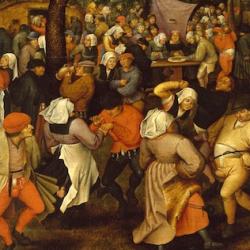The confusion about marriage in contemporary America is profound. It’s a confusion about the very roots of marriage. Few confusions are more basic than the notion that marriage is essentially a matter of freedom. Scripturally, the opposite is true. Marriage is a form of bondage.
Paul alludes to this point subtly in the way he describes marriage in Romans 7 and 1 Corinthians 7. His phrase “bound to a wife” uses the Greek verb deo, used elsewhere in the New Testament to describe the strong man bound by a stronger (Matthew 12:29), the binding of Jesus (Matthew 27:2) and the apostles (Acts 9:14, 21; 12:6; 21:11, 13, 33; etc.), the binding of Satan (Revelation 20:2). In every other use of the verb, it describes restraint, limitation of movement and action. Slaves and defeated solders and captives are bound.
Slaves and captives and men who are “bound to” a wife.
This is not a stray verbal tic, but goes to the heart of Paul’s understanding of marriage. Being bound to a wife means being one flesh (Ephesians 5). One is no more “free” in relation to a husband or wife than one is free from his own flesh. And husbands and wives are to serve one another in love, each bound as slaves to the other.
Paul explicitly describes the relation of husband and wife as a relation of mutual authority and mutual submission (1 Corinthians 7): The husband doesn’t have the right to use his own body, since his body is under the authority of (bound to) his wife; the wife doesn’t have authority over her own body but the husband does (1 Corinthians 7:3). This relation of mutual authority has, Paul says, a structure to it, the husband placed as head over the body of his wife, as Christ is head of His church (Ephesians 5). Whichever angle we look at it, marriage doesn’t have to do with breaking chains but with forging them.
Paul’s theology is, of course, a theology of freedom. It is for freedom that Christ set us free, so long as we don’t use the freedom to indulge the flesh. But we use our freedom rightly only if we use is to “serve/be enslaved” (Greek, douleuo) to one another in love (Galatians 5:1, 13). Boundness to one another is the very form of freedom.
The “old ball and chain” wisecrack gets this right, though without the sexist overtones. Ball and chain works both ways. The husband is as much a slave to the wife as the wife to the husband. Bound to one another, they are together bound (if Christian) to Christ. And in that network of chains and shackles, we find liberty.













